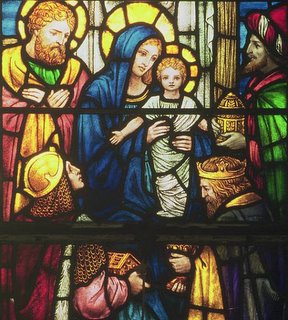"Redemption rips through the surface of time in the cry of a tiny babe..."
Saturday, December 24, 2005
Saturday, November 26, 2005
Book Review: The Revolution
 I read a pre-release copy of George Barna's latest book, The Revolution back in the summer but have held off posting a review until now that it's actually available. As you can see from my previous post, a great number of my thoughts these days are on what it means to be the church as opposed to going to church. The Revolution considers this as well but takes it one step further...what if the most committed Christ-followers, those who are really "on fire," no longer attend church because it leaves them feeling spiritually drained and disconnected from God?
I read a pre-release copy of George Barna's latest book, The Revolution back in the summer but have held off posting a review until now that it's actually available. As you can see from my previous post, a great number of my thoughts these days are on what it means to be the church as opposed to going to church. The Revolution considers this as well but takes it one step further...what if the most committed Christ-followers, those who are really "on fire," no longer attend church because it leaves them feeling spiritually drained and disconnected from God?According to Barna's research, by the year 2025, "I expect that only about one-third of the population will rely upon a local congregation as the primary or exclusive means for experiencing and expressing their fait; one-third will do so through alternative forms of faith-based community; and one-third will realize their faith through the media, the arts, and other cultural institutions." Pretty radical stuff, yet not especially surprising considering the number of people I know who have "dropped-out" of church in the last couple of years. For the most part, these people would still consider themselves believers, but the local church and its institutions don't hold any appeal for them. So where do we go from here? This is where Barna spends the majority of his book.
He considers what a Revolutionary looks like, what a Revolutionary is looking for, what the local church needs to do in response, and how to become a revolutionary yourself. Note that becoming a “revolutionary” doesn’t necessarily mean giving up on your local church; it simply means living a radically different lifestyle and being the church in your community. Barna again, “These extreme God-lovers reform the culture simply by being true representations of who God made them to be. They do not create and enforce a carefully plotted and meticulously deployed agenda of reform. They simply live a holy and obedient life that a society suffering from the stranglehold of sin cannot ignore.”
There are many ramifications of this revolutionary shift and Barna is not afraid to tackle them head on: what will happen to church attendance in the next 20 years? How will this affect pastoral staffs? And who’s going to supply the funds to keep a church running? Good questions, all.
Label it what you will, there is a movement afoot in the church and George Barna has written a book that will provide a perfect summary for those who want to understand what the fuss is all about. It just might inspire you to start a revolution of your own. YYYYY
Friday, November 25, 2005
Mosaic Conference
I had the opportunity last week to attend the MOSAIC church planting conference in Toronto as part of my responsibilities to promote the New Living Translation. While I didn't have a lot of free time, I did manage to partially take in two sessions - Rick McKinley (Donald Miller's pastor) and Erwin McManus. These were both interesting sessions in that we heard what these guys are doing in their respective communities (Portland, Los Angeles) and how they are reinterpreting what it means to "do church" in a postmodern era. Call them postmodern, postevangelical, emerging church, or whatever you want, they are doing some interesting things in the name of the Kingdom.
On the downside, most of the discussion (that I heard anyway) centered on inner-city churches, and working with the urban poor. Great stuff, but what about us who live and work in a white collar, middle-class, suburban setting? How do we go about engaging people with the message of Jesus when for the most part, they are happy, satisfied, self-sufficient people? It would seem to me that we too have to conceive of new ways of "doing church" that meets these folks where they are at. This is my struggle...not that I want to plant a church, but I definitely want to be the church in my neighbourhood. I guess that makes me a church plant! I guess that makes all Christ-followers a church plant! Hmmm...now that's something to think about!
Here are some interesting stats I picked up...
Total evangelical congregations in Canada (all denominations): 9,401
Largest denomination: Pentecostal Assemblies of Canada: 1,106 Congregations
Number of people in Canada for each evangelical church: 4,035
Province with the greatest number of churches per capita: New Brunswick
Province with the least number of churches per capita: Quebec
On the downside, most of the discussion (that I heard anyway) centered on inner-city churches, and working with the urban poor. Great stuff, but what about us who live and work in a white collar, middle-class, suburban setting? How do we go about engaging people with the message of Jesus when for the most part, they are happy, satisfied, self-sufficient people? It would seem to me that we too have to conceive of new ways of "doing church" that meets these folks where they are at. This is my struggle...not that I want to plant a church, but I definitely want to be the church in my neighbourhood. I guess that makes me a church plant! I guess that makes all Christ-followers a church plant! Hmmm...now that's something to think about!
Here are some interesting stats I picked up...
Total evangelical congregations in Canada (all denominations): 9,401
Largest denomination: Pentecostal Assemblies of Canada: 1,106 Congregations
Number of people in Canada for each evangelical church: 4,035
Province with the greatest number of churches per capita: New Brunswick
Province with the least number of churches per capita: Quebec
Tuesday, November 22, 2005
Thursday, November 03, 2005
Book Review: Flashbang
 Let me start by saying that Flashbang is one of the funniest books I have ever read. Mark Steele has had a lifetime of crazy experiences and manages to roll most of them into this book. Not only are his stories hilarious but he also draws some meaning out of them as he looks back on all of the ways that God has been leading him from birds drowning in spaghetti sauce to having shock therapy to restore his facial muscles. This book is a must read; but a word of advice, listen to Mark read from one of the chapters here then read the book with his voice as the narrator and you'll find yourself laughing out loud every time you pick it up! The humour will draw you in, but it is the final thought that will knock you right between the eyes. Steele concludes by saying,
Let me start by saying that Flashbang is one of the funniest books I have ever read. Mark Steele has had a lifetime of crazy experiences and manages to roll most of them into this book. Not only are his stories hilarious but he also draws some meaning out of them as he looks back on all of the ways that God has been leading him from birds drowning in spaghetti sauce to having shock therapy to restore his facial muscles. This book is a must read; but a word of advice, listen to Mark read from one of the chapters here then read the book with his voice as the narrator and you'll find yourself laughing out loud every time you pick it up! The humour will draw you in, but it is the final thought that will knock you right between the eyes. Steele concludes by saying,"So I press on until all of the flash and noise the world attempts to drum up will result in no effect on me whatsoever. Where I was once the one weeping, wailing, and waving my arms to get the world's attention with no actual result - now the roles have reversed.
I will not be distracted by the explosions I now know are frauds.
I hear the bombs and will not be swayed.
I see the flashes and will not be blinded.
And when the enemy takes his best shot - by the grace of God, I will remain unmoved.
Because the world and I have traded places.
I am now grounded in the rock.
And because Jesus is my anchor -
It is the world who is the flashbang."
YYYYY
Monday, October 17, 2005
Book Review: Walk On
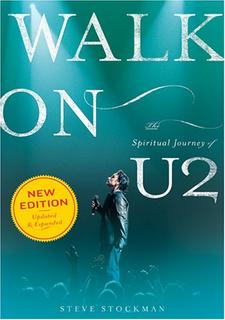 I picked up Steve Stockman's book Walk On: The Spiritual Journey of U2 with a bit of reluctance. Being a hardcore U2 fan for so long I really questioned whether Stockman could really tell me anything I wasn't already aware of about my favourite band. The answer? Yes and no.
I picked up Steve Stockman's book Walk On: The Spiritual Journey of U2 with a bit of reluctance. Being a hardcore U2 fan for so long I really questioned whether Stockman could really tell me anything I wasn't already aware of about my favourite band. The answer? Yes and no.I can’t say I made any great discoveries about the band or the influence of the gospel in their music. That being said, if you are a casual fan of U2 or have wondered about where these guys stand in terms of their faith in Christ, this is the book for you. I’ve heard so many comments like, “supposedly these guys used to be Christians” and other such remarks. Believe me, if you’ve really read their lyrics, even during the Achtung/Zooropa/Pop years, you would find a deep faith that is seeking to take the Kingdom to the darkest corners of the world while not being afraid to deal with all of the doubts and hypocrisies that those of us who are called Christ followers often try to ignore. If anything, the book falls into the trap of becoming an apologetic for Bono, painting him as a bit of a saint when in fact, he has many shortcomings just like the rest of us.
There are also some interesting details here that I wasn't aware of about the early influences on the band and the environment in which they grew up. But perhaps the most interesting thing I learned was about Bono’s best friends – Gavin Friday and Guggi of the Virgin Prunes. I’m a big fan of Gavin Friday’s solo work so it came as a bit of a surprise that he was, for a short time, part of the Shalom Christian fellowship that Bono, Edge, and Larry were also a part of. It was also fascinating to find out that Adam, for so many years known as the non-believer in the group, the partier who enjoyed all of the excesses of being a rock star, has now come to a point of faith as well.
Stockman goes through each album in the U2 discography to identify the Christian themes that are woven throughout the lyrics from I Will Follow on their first album through to Yahweh on their latest. The only point to be aware of is that Stockman does not draw on any personal interviews with the band. His body of research consists of quotes from previously published articles, books, and interviews. Not the end of the world, but don’t be looking for new material here either. While not on the same level as John Waters’ brilliant book Race of Angels, it is still a worthwhile read for the casual and the hardcore fan alike. YYYY
Friday, October 14, 2005
Chuck Colson Article
Just a quick reference today to an excellent article posted at ChristianityToday.com by Chuck Colson. Chuck's visit to his autistic grandson's school raised some deep questions for him about the logical, but frightening conclusion of Utilitarian philosophy espoused by John Stuart Mill and taken up more recently by Peter Singer at Princeton. Click here for the article.
Sunday, October 09, 2005
So Long, Tom
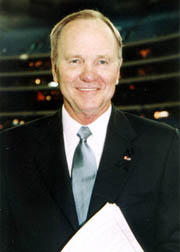 Tom Cheek died today at his home in Oldsmar, Florida at the age of 66. For those of you who grew up in Toronto or Southern Ontario in the 70's, 80's and 90's, Tom Cheek was the voice of the Toronto Blue Jays radio broadcasts from 1977, the year the Jays entered the league, until 2004 - an amazing 4,306 consecutive games.
Tom Cheek died today at his home in Oldsmar, Florida at the age of 66. For those of you who grew up in Toronto or Southern Ontario in the 70's, 80's and 90's, Tom Cheek was the voice of the Toronto Blue Jays radio broadcasts from 1977, the year the Jays entered the league, until 2004 - an amazing 4,306 consecutive games.But Tom's voice was more than simply that of a baseball announcer; it was synonymous with the promise of summer, even while the snow still lay on the ground at the start of the baseball season in April. Just as the previous generation came to love the voice of Foster Hewitt with his Saturday night greeting, "Hello Canada and hockey fans in the United States...", those of us born in the late 60's into the 70's will always remember Tom's affirmation that it was indeed, "a great day for baseball..."
He introduced me, and thousands of others, to this game that was so popular with our neighbours to the south, but was a whole new experience for those of us in the land of sticks and pucks. From Bill Singer’s first pitch in 1977 to Joe Carter’s World Series winning home run in 1993, Tom was our constant companion and a kid’s best friend in the long, hot days of summer.
Just this year I started listening to baseball on the radio again. There’s a certain tranquility that comes from listening to the play-by-play and the familiar, old-fashioned lingo unique to the baseball diamond. But this time, it was different. With Tom unable to call the games anymore, I had a very real sense that the world had changed. The voice that had so often reminded me of lazy summer afternoons in Toronto had been silenced and along with it, was my ability to go back to a more innocent time when all that mattered was the ballgame and what time I had to be home for dinner.
Baseball is an old game; a game of traditions that should be respected and not easily exchanged for the unfamiliar. While the new broadcast team does a fine job, Tom Cheek was the voice. He will be greatly missed.
Friday, September 23, 2005
Alfred the Great

I've been slowly working my way through Simon Schama's book The History of Britain Vol. 1, based on the video series of the same name. It's a great read, but one episode in particular has really grabbed my interest.
Ever heard of Alfred the Great? Neither had I but this guy's story is the kind of stuff Mel Gibson makes movies about. So Mel, if you should stumble across this post, get busy! There are tons of resources online to find out about Alfred, so I'll just give you the executive summary.
Alfred the Great (849-899 AD) is the only English monarch ever to be given the title "the Great" by his people. As a young man Alfred had wanted to become a priest and a scholar but that wasn't to be. As Britain became overrun with Danes (Vikings) who subjugated the native Britains to slave hood, Alfred's father king Aethelred of Wessex, the only remaining independent kingdom, decided to fight rather than try to negotiate like so many other kings had done - to their own ruin (Vikings didn't make very trustworthy negotiating partners!)
The Danes were temporarily defeated, but in the battle, king Aethelred was killed, leaving Alfred's brother Ethelred as king. Ethelred died a short time later, however, and Alfred became king of Wessex at the age of 21. When the Vikings invaded in early 878 the people of Wessex were devastated and Alfred was forced to live in a swamp with a few of his remaining men. From this swamp, they would slip into town for food and supplies as they made preparations to battle the Danes once again. One great story has Alfred getting chewed out by a peasant woman, who was unaware of his identity, for burning some cakes on a fire. From Wikipedia: "Preoccupied with the problems of the kingdom, Alfred let the cakes burn, and was taken to task by the woman on her return. Upon realizing the king's identity, the woman apologized profusely, but Alfred insisted that he was the one who needed to apologize. The thought that Alfred, during his retreat at Athelney, was a helpless fugitive rests upon the legend of the cakes. In truth, he was organizing victory. ”Truly, an officer and a gentleman!
At this same time, Alfred had disguised himself as a harpist and snuck into the Viking camp to discover their plans! When the two armies met at the Battle of Edington in 879, Alfred and his army won a decisive victory. Not only did he defeat the Viking king Guthrum, but Guthrum converted to Christianity and lived out the rest of his days as a farmer in East Anglia.
From the website of the British Monarchy: "By stopping the Viking advance and consolidating his territorial gains, Alfred had started the process by which his successors eventually extended their power over the other Anglo-Saxon kings; the ultimate unification of Anglo-Saxon England was to be led by Wessex. It is for his valiant defence of his kingdom against a stronger enemy, for securing peace with the Vikings and for his farsighted reforms in the reconstruction of Wessex and beyond, that Alfred - alone of all the English kings and queens - is known as 'the Great'."
What a great story! I can't believe no one has made a movie out of this!!
For more info visit:
http://en.wikipedia.org/wiki/Alfred_the_Great
http://www.royal.gov.uk/output/Page25.asp
http://www.bbc.co.uk/history/historic_figures/alfred_king.shtml
http://www.britannia.com/history/monarchs/mon6.html
Thursday, September 22, 2005
Bono on Faith
My final U2 post for a while...If you want a good summary of Bono's faith, check out this excerpt from Christianity Today taken from the new biography that is currently in stores simply called Bono: In Conversation.
Bono: My understanding of the Scriptures has been made simple by the person of Christ. Christ teaches that God is love. What does that mean? What it means for me: a study of the life of Christ. Love here describes itself as a child born in straw poverty, the most vulnerable situation of all, without honor. I don't let my religious world get too complicated. I just kind of go: Well, I think I know what God is. God is love, and as much as I respond [sighs] in allowing myself to be transformed by that love and acting in that love, that's my religion. Where things get complicated for me, is when I try to live this love. Now that's not so easy.
Assayas: What about the God of the Old Testament? He wasn't so "peace and love"?
Bono: There's nothing hippie about my picture of Christ. The Gospels paint a picture of a very demanding, sometimes divisive love, but love it is. I accept the Old Testament as more of an action movie: blood, car chases, evacuations, a lot of special effects, seas dividing, mass murder, adultery. The children of God are running amok, wayward. Maybe that's why they're so relatable. But the way we would see it, those of us who are trying to figure out our Christian conundrum, is that the God of the Old Testament is like the journey from stern father to friend. When you're a child, you need clear directions and some strict rules. But with Christ, we have access in a one-to-one relationship, for, as in the Old Testament, it was more one of worship and awe, a vertical relationship. The New Testament, on the other hand, we look across at a Jesus who looks familiar, horizontal. The combination is what makes the Cross.
Assayas: Speaking of bloody action movies, we were talking about South and Central America last time. The Jesuit priests arrived there with the gospel in one hand and a rifle in the other.
Bono: I know, I know. Religion can be the enemy of God. It's often what happens when God, like Elvis, has left the building. [laughs] A list of instructions where there was once conviction; dogma where once people just did it; a congregation led by a man where once they were led by the Holy Spirit. Discipline replacing discipleship. Why are you chuckling?
Assayas: I was wondering if you said all of that to the Pope the day you met him.
Bono: Let's not get too hard on the Holy Roman Church here. The Church has its problems, but the older I get, the more comfort I find there. The physical experience of being in a crowd of largely humble people, heads bowed, murmuring prayers, stories told in stained-glass windows …
Assayas: So you won't be critical.
Bono: No, I can be critical, especially on the topic of contraception. But when I meet someone like Sister Benedicta and see her work with AIDS orphans in Addis Ababa, or Sister Ann doing the same in Malawi, or Father Jack Fenukan and his group Concern all over Africa, when I meet priests and nuns tending to the sick and the poor and giving up much easier lives to do so, I surrender a little easier.
Assayas: But you met the man himself. Was it a great experience?
Bono: … [W]e all knew why we were there. The Pontiff was about to make an important statement about the inhumanity and injustice of poor countries spending so much of their national income paying back old loans to rich countries. Serious business. He was fighting hard against his Parkinson's. It was clearly an act of will for him to be there. I was oddly moved … by his humility, and then by the incredible speech he made, even if it was in whispers. During the preamble, he seemed to be staring at me. I wondered. Was it the fact that I was wearing my blue fly-shades? So I took them off in case I was causing some offense. When I was introduced to him, he was still staring at them. He kept looking at them in my hand, so I offered them to him as a gift in return for the rosary he had just given me.
Assayas: Didn't he put them on?
Bono: Not only did he put them on, he smiled the wickedest grin you could ever imagine. He was a comedian. His sense of humor was completely intact. Flashbulbs popped, and I thought: "Wow! The Drop the Debt campaign will have the Pope in my glasses on the front page of every newspaper."
Assayas: I don't remember seeing that photograph anywhere, though.
Bono: Nor did we. It seems his courtiers did not have the same sense of humor. Fair enough. I guess they could see the T-shirts.
Later in the conversation:
Assayas: I think I am beginning to understand religion because I have started acting and thinking like a father. What do you make of that?
Bono: Yes, I think that's normal. It's a mind-blowing concept that the God who created the universe might be looking for company, a real relationship with people, but the thing that keeps me on my knees is the difference between Grace and Karma.
Assayas: I haven't heard you talk about that.
Bono: I really believe we've moved out of the realm of Karma into one of Grace.
Assayas: Well, that doesn't make it clearer for me.
Bono: You see, at the center of all religions is the idea of Karma. You know, what you put out comes back to you: an eye for an eye, a tooth for a tooth, or in physics—in physical laws—every action is met by an equal or an opposite one. It's clear to me that Karma is at the very heart of the universe. I'm absolutely sure of it. And yet, along comes this idea called Grace to upend all that "as you reap, so you will sow" stuff. Grace defies reason and logic. Love interrupts, if you like, the consequences of your actions, which in my case is very good news indeed, because I've done a lot of stupid stuff.
Assayas: I'd be interested to hear that.
Bono: That's between me and God. But I'd be in big trouble if Karma was going to finally be my judge. I'd be in deep s---. It doesn't excuse my mistakes, but I'm holding out for Grace. I'm holding out that Jesus took my sins onto the Cross, because I know who I am, and I hope I don't have to depend on my own religiosity.
Assayas: The Son of God who takes away the sins of the world. I wish I could believe in that.
Bono: But I love the idea of the Sacrificial Lamb. I love the idea that God says: Look, you cretins, there are certain results to the way we are, to selfishness, and there's a mortality as part of your very sinful nature, and, let's face it, you're not living a very good life, are you? There are consequences to actions. The point of the death of Christ is that Christ took on the sins of the world, so that what we put out did not come back to us, and that our sinful nature does not reap the obvious death. That's the point. It should keep us humbled… . It's not our own good works that get us through the gates of heaven.
Assayas: That's a great idea, no denying it. Such great hope is wonderful, even though it's close to lunacy, in my view. Christ has his rank among the world's great thinkers. But Son of God, isn't that farfetched?
Bono: No, it's not farfetched to me. Look, the secular response to the Christ story always goes like this: he was a great prophet, obviously a very interesting guy, had a lot to say along the lines of other great prophets, be they Elijah, Muhammad, Buddha, or Confucius. But actually Christ doesn't allow you that. He doesn't let you off that hook. Christ says: No. I'm not saying I'm a teacher, don't call me teacher. I'm not saying I'm a prophet. I'm saying: "I'm the Messiah." I'm saying: "I am God incarnate." And people say: No, no, please, just be a prophet. A prophet, we can take. You're a bit eccentric. We've had John the Baptist eating locusts and wild honey, we can handle that. But don't mention the "M" word! Because, you know, we're gonna have to crucify you. And he goes: No, no. I know you're expecting me to come back with an army, and set you free from these creeps, but actually I am the Messiah. At this point, everyone starts staring at their shoes, and says: Oh, my God, he's gonna keep saying this. So what you're left with is: either Christ was who He said He was—the Messiah—or a complete nutcase. I mean, we're talking nutcase on the level of Charles Manson. This man was like some of the people we've been talking about earlier. This man was strapping himself to a bomb, and had "King of the Jews" on his head, and, as they were putting him up on the Cross, was going: OK, martyrdom, here we go. Bring on the pain! I can take it. I'm not joking here. The idea that the entire course of civilization for over half of the globe could have its fate changed and turned upside-down by a nutcase, for me, that's farfetched …
Bono later says it all comes down to how we regard Jesus:
Bono: … [I]f only we could be a bit more like Him, the world would be transformed. …When I look at the Cross of Christ, what I see up there is all my s--- and everybody else's. So I ask myself a question a lot of people have asked: Who is this man? And was He who He said He was, or was He just a religious nut? And there it is, and that's the question. And no one can talk you into it or out of it.
From Bono: In Conversation with Michka Assayas, by Michka Assayas, copyright © 2005 by Michka Awwayas. Used by permission of Riverhead Books, an imprint of Penguin Group (USA) Inc. For online information about other Penguin Group (USA) books and authors, see the website at www.penguin.com.
Bono: My understanding of the Scriptures has been made simple by the person of Christ. Christ teaches that God is love. What does that mean? What it means for me: a study of the life of Christ. Love here describes itself as a child born in straw poverty, the most vulnerable situation of all, without honor. I don't let my religious world get too complicated. I just kind of go: Well, I think I know what God is. God is love, and as much as I respond [sighs] in allowing myself to be transformed by that love and acting in that love, that's my religion. Where things get complicated for me, is when I try to live this love. Now that's not so easy.
Assayas: What about the God of the Old Testament? He wasn't so "peace and love"?
Bono: There's nothing hippie about my picture of Christ. The Gospels paint a picture of a very demanding, sometimes divisive love, but love it is. I accept the Old Testament as more of an action movie: blood, car chases, evacuations, a lot of special effects, seas dividing, mass murder, adultery. The children of God are running amok, wayward. Maybe that's why they're so relatable. But the way we would see it, those of us who are trying to figure out our Christian conundrum, is that the God of the Old Testament is like the journey from stern father to friend. When you're a child, you need clear directions and some strict rules. But with Christ, we have access in a one-to-one relationship, for, as in the Old Testament, it was more one of worship and awe, a vertical relationship. The New Testament, on the other hand, we look across at a Jesus who looks familiar, horizontal. The combination is what makes the Cross.
Assayas: Speaking of bloody action movies, we were talking about South and Central America last time. The Jesuit priests arrived there with the gospel in one hand and a rifle in the other.
Bono: I know, I know. Religion can be the enemy of God. It's often what happens when God, like Elvis, has left the building. [laughs] A list of instructions where there was once conviction; dogma where once people just did it; a congregation led by a man where once they were led by the Holy Spirit. Discipline replacing discipleship. Why are you chuckling?
Assayas: I was wondering if you said all of that to the Pope the day you met him.
Bono: Let's not get too hard on the Holy Roman Church here. The Church has its problems, but the older I get, the more comfort I find there. The physical experience of being in a crowd of largely humble people, heads bowed, murmuring prayers, stories told in stained-glass windows …
Assayas: So you won't be critical.
Bono: No, I can be critical, especially on the topic of contraception. But when I meet someone like Sister Benedicta and see her work with AIDS orphans in Addis Ababa, or Sister Ann doing the same in Malawi, or Father Jack Fenukan and his group Concern all over Africa, when I meet priests and nuns tending to the sick and the poor and giving up much easier lives to do so, I surrender a little easier.
Assayas: But you met the man himself. Was it a great experience?
Bono: … [W]e all knew why we were there. The Pontiff was about to make an important statement about the inhumanity and injustice of poor countries spending so much of their national income paying back old loans to rich countries. Serious business. He was fighting hard against his Parkinson's. It was clearly an act of will for him to be there. I was oddly moved … by his humility, and then by the incredible speech he made, even if it was in whispers. During the preamble, he seemed to be staring at me. I wondered. Was it the fact that I was wearing my blue fly-shades? So I took them off in case I was causing some offense. When I was introduced to him, he was still staring at them. He kept looking at them in my hand, so I offered them to him as a gift in return for the rosary he had just given me.
Assayas: Didn't he put them on?
Bono: Not only did he put them on, he smiled the wickedest grin you could ever imagine. He was a comedian. His sense of humor was completely intact. Flashbulbs popped, and I thought: "Wow! The Drop the Debt campaign will have the Pope in my glasses on the front page of every newspaper."
Assayas: I don't remember seeing that photograph anywhere, though.
Bono: Nor did we. It seems his courtiers did not have the same sense of humor. Fair enough. I guess they could see the T-shirts.
Later in the conversation:
Assayas: I think I am beginning to understand religion because I have started acting and thinking like a father. What do you make of that?
Bono: Yes, I think that's normal. It's a mind-blowing concept that the God who created the universe might be looking for company, a real relationship with people, but the thing that keeps me on my knees is the difference between Grace and Karma.
Assayas: I haven't heard you talk about that.
Bono: I really believe we've moved out of the realm of Karma into one of Grace.
Assayas: Well, that doesn't make it clearer for me.
Bono: You see, at the center of all religions is the idea of Karma. You know, what you put out comes back to you: an eye for an eye, a tooth for a tooth, or in physics—in physical laws—every action is met by an equal or an opposite one. It's clear to me that Karma is at the very heart of the universe. I'm absolutely sure of it. And yet, along comes this idea called Grace to upend all that "as you reap, so you will sow" stuff. Grace defies reason and logic. Love interrupts, if you like, the consequences of your actions, which in my case is very good news indeed, because I've done a lot of stupid stuff.
Assayas: I'd be interested to hear that.
Bono: That's between me and God. But I'd be in big trouble if Karma was going to finally be my judge. I'd be in deep s---. It doesn't excuse my mistakes, but I'm holding out for Grace. I'm holding out that Jesus took my sins onto the Cross, because I know who I am, and I hope I don't have to depend on my own religiosity.
Assayas: The Son of God who takes away the sins of the world. I wish I could believe in that.
Bono: But I love the idea of the Sacrificial Lamb. I love the idea that God says: Look, you cretins, there are certain results to the way we are, to selfishness, and there's a mortality as part of your very sinful nature, and, let's face it, you're not living a very good life, are you? There are consequences to actions. The point of the death of Christ is that Christ took on the sins of the world, so that what we put out did not come back to us, and that our sinful nature does not reap the obvious death. That's the point. It should keep us humbled… . It's not our own good works that get us through the gates of heaven.
Assayas: That's a great idea, no denying it. Such great hope is wonderful, even though it's close to lunacy, in my view. Christ has his rank among the world's great thinkers. But Son of God, isn't that farfetched?
Bono: No, it's not farfetched to me. Look, the secular response to the Christ story always goes like this: he was a great prophet, obviously a very interesting guy, had a lot to say along the lines of other great prophets, be they Elijah, Muhammad, Buddha, or Confucius. But actually Christ doesn't allow you that. He doesn't let you off that hook. Christ says: No. I'm not saying I'm a teacher, don't call me teacher. I'm not saying I'm a prophet. I'm saying: "I'm the Messiah." I'm saying: "I am God incarnate." And people say: No, no, please, just be a prophet. A prophet, we can take. You're a bit eccentric. We've had John the Baptist eating locusts and wild honey, we can handle that. But don't mention the "M" word! Because, you know, we're gonna have to crucify you. And he goes: No, no. I know you're expecting me to come back with an army, and set you free from these creeps, but actually I am the Messiah. At this point, everyone starts staring at their shoes, and says: Oh, my God, he's gonna keep saying this. So what you're left with is: either Christ was who He said He was—the Messiah—or a complete nutcase. I mean, we're talking nutcase on the level of Charles Manson. This man was like some of the people we've been talking about earlier. This man was strapping himself to a bomb, and had "King of the Jews" on his head, and, as they were putting him up on the Cross, was going: OK, martyrdom, here we go. Bring on the pain! I can take it. I'm not joking here. The idea that the entire course of civilization for over half of the globe could have its fate changed and turned upside-down by a nutcase, for me, that's farfetched …
Bono later says it all comes down to how we regard Jesus:
Bono: … [I]f only we could be a bit more like Him, the world would be transformed. …When I look at the Cross of Christ, what I see up there is all my s--- and everybody else's. So I ask myself a question a lot of people have asked: Who is this man? And was He who He said He was, or was He just a religious nut? And there it is, and that's the question. And no one can talk you into it or out of it.
From Bono: In Conversation with Michka Assayas, by Michka Assayas, copyright © 2005 by Michka Awwayas. Used by permission of Riverhead Books, an imprint of Penguin Group (USA) Inc. For online information about other Penguin Group (USA) books and authors, see the website at www.penguin.com.
Wednesday, September 21, 2005
U2...the Photos...the Confession
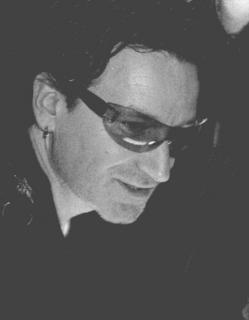 Well, I've had a little more time to ponder my U2 experience on Saturday, not to mention some more sleep, so I think I'll be able to post a little more coherently today. I was hoping to post some pictures to give you an idea of just how close we were to the stage but for some reason the upload isn't working for me so just click here to find some good shots by someone who was in almost the exact same spot as us but on a different night. Special thanks to Andrea over at Green Tea Contingency for the use of her photos! Instead, I'll just post some shots I took when the band made an appearance at MuchMusic back in 2001. And now for the confession...
Well, I've had a little more time to ponder my U2 experience on Saturday, not to mention some more sleep, so I think I'll be able to post a little more coherently today. I was hoping to post some pictures to give you an idea of just how close we were to the stage but for some reason the upload isn't working for me so just click here to find some good shots by someone who was in almost the exact same spot as us but on a different night. Special thanks to Andrea over at Green Tea Contingency for the use of her photos! Instead, I'll just post some shots I took when the band made an appearance at MuchMusic back in 2001. And now for the confession...As I said in my previous post, I've been called a U2 fanatic at various times in my life but I'm really not much into the cult of celebrity at all. As a matter of fact, it quite sickens me. Even at some of the functions I attend for my job there are a lot of big-time "Christian celebrities" around, but for the most part, I just say hi or try to steer clear altogether if I can get away with it. That being said, it was still a real thrill for me to get this close to the band I've been following since I was a teenager when I heard Under A Blood Red Sky for the first time. That experience and this band have quite literally changed my life. Were it not for U2, and more specifically
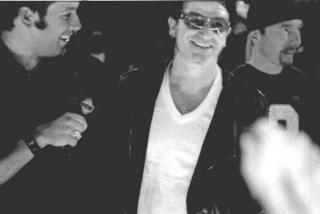 , Bono, I wouldn't be as socially aware as I am, I wouldn't have the same worldview I do, and I wouldn't be the same Christian I am today.
, Bono, I wouldn't be as socially aware as I am, I wouldn't have the same worldview I do, and I wouldn't be the same Christian I am today.Even I think that sounds pretty heavy, and almost fanatical as I write it, but in a very real sense, these guys have been my mentors as I've tried to make my way through the last 20 years. We all have those we lean on and learn from over the course of time - some are close friends, some are older folks who have gone before us, and some are even favorite authors or leaders who have challenged us or made us look at the world from a new perspective. I have those kind of mentors too, but I learned a long time ago that U2 is more than simply four guys who make great music. They are four men on a spiritual journey that has lead us into some dark places where we might not ch
 oose to go on our own; but it has also led us into the light to see the hand of God in the world around us.
oose to go on our own; but it has also led us into the light to see the hand of God in the world around us.As T-Bone Burnett said, "If Jesus is the light of the world there are two kinds of songs you can write. You can write songs about the light, or you can write songs about what you can see from the light." U2's music has opened my eyes to what can be seen by the light and in so doing, has drawn me closer to the light of the world.
Grace, she takes the blame
She covers the shame
Removes the stain
It could be her name
Grace, it's the name for a girl
It's also a thought that changed the world...
(Grace, from All That You Can't Leave Behind)
Sunday, September 18, 2005
Vertigo in Toronto
 Where can I even begin? I was at the U2 show at Air Canada Centre on Saturday night and, needless to say, it was amazing! This is the fifth time I've seen U2 and every experience has been unique in its own way, but Saturday was absolutely unforgettable.
Where can I even begin? I was at the U2 show at Air Canada Centre on Saturday night and, needless to say, it was amazing! This is the fifth time I've seen U2 and every experience has been unique in its own way, but Saturday was absolutely unforgettable.I met up with my buddy Bill in Mississauga and we headed down to the ACC a couple of hours before they opened the doors at 6:30. We had general admission floor tickets and we didn't want to be stuck at the back of the arena so we made sure we were in line in decent time. I would estimate there were 300 or so people ahead of us.
As we filed through security, I could see that they were scanning everyone’s tickets to see if they were one of the chosen few to make it inside the ellipse (see photo above). I hadn’t really given this much thought ahead of time. I mean, what are the chances of having a winning ticket out of the 18,000 or so tickets that were sold for the show? My buddy went through – not a winner – then they scanned my ticket and lo and behold, A WINNER! To make a long story short, the two of us were allowed to enter the “inner circle” and ended up about 6 feet from the stage! It was as if I was seeing them 25 years ago in a little club somewhere.
Now, if you don’t know me, you may think, “big deal, so you made it to the stage.” But for those who do, you will know that I am somewhat of a U2 fanatic. My over-the-top fandom has cooled a bit now that I’m older and apparently more mature, but after 4 previous concerts in big stadiums, only sort of seeing the band on the stage, this was like a dream come true. And a dream it was, for even now I can scarcely recall the details. It only seems half real.
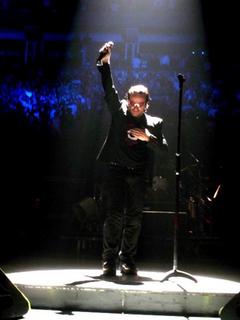 I could give you particulars about the concert itself – the set list, the commentary, the surprise guests – but you can find that elsewhere on-line. I’d prefer just to give you my personal take on the night. The dedication of Miracle Drug to the Hospital for Sick Children in Toronto (who saved my life when I was born) brought a tear to my eye. One was turned into a prayer and I found myself praying as well (“do you hear me knockin’ Lord…?”), Yahweh & 40 to end the night...it felt like we had just done church and to a certain extent, maybe we did.
I could give you particulars about the concert itself – the set list, the commentary, the surprise guests – but you can find that elsewhere on-line. I’d prefer just to give you my personal take on the night. The dedication of Miracle Drug to the Hospital for Sick Children in Toronto (who saved my life when I was born) brought a tear to my eye. One was turned into a prayer and I found myself praying as well (“do you hear me knockin’ Lord…?”), Yahweh & 40 to end the night...it felt like we had just done church and to a certain extent, maybe we did.My U2 concert history…
March 28, 1985 – Maple Leaf Gardens
October 3, 1987 – Exhibition Stadium
September 6, 1992 – Exhibition Stadium
October 26, 1997 – Skydome
September 17, 2005 – Air Canada Centre
Subscribe to:
Posts (Atom)
